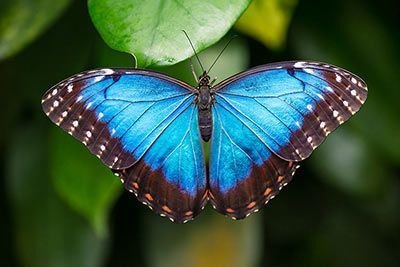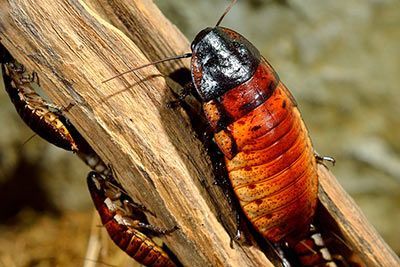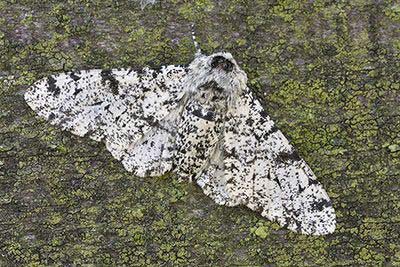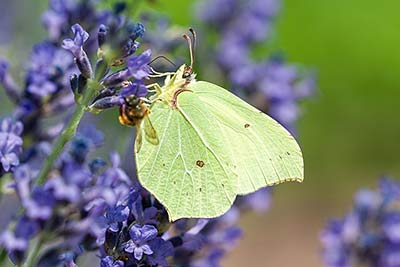Scorpion
Scorpion Facts
| Size | Up to 8.2 in (21 cm) |
| Speed | Up to 12 mph (19 km/h) |
| Weight | 0.3-3.5 oz (10-100 g) |
| Lifespan | 4-25 years |
| Food | Millipedes, shrew mice, owls, bats |
| Predators | Rodents, birds, lizards |
| Habitat | Worldwide (except Antarctic region) |
| Phylum | Arthropods |
| Class | Scorpions |
| Order | Arachnids |
| Scientific name | Scorpiones |
| Characteristics | Long poison sting at the tail, two claws |
Main Characteristics
Today we know 1,400 scorpion species. 2,000 are still waiting to be exactly classified. Only 40-50 species are poisonous enough to kill a human being.
Scorpion Species
Insect or Spider?
Scorpions are no insects, they are members of the class of Arachnidae.
Anatomy and Appearance
The Biggest Scorpion
The largest scorpion is the flat rock scorpion Hadogenes troglodytes with a length of up to 8.2 inch (21 cm).
The Smallest Scorpion
The smallest scorpion is a member of the Buthidae family named Microbuthus pusillus. It does not grow longer than 0.25 inch (6.5 mm).
The Heavest Scorpion
The heaviest scorpion is the African emperor scorpion with a length of up to 7 inch (18 cm). It weighs impressive 2.1 oz (60 g).
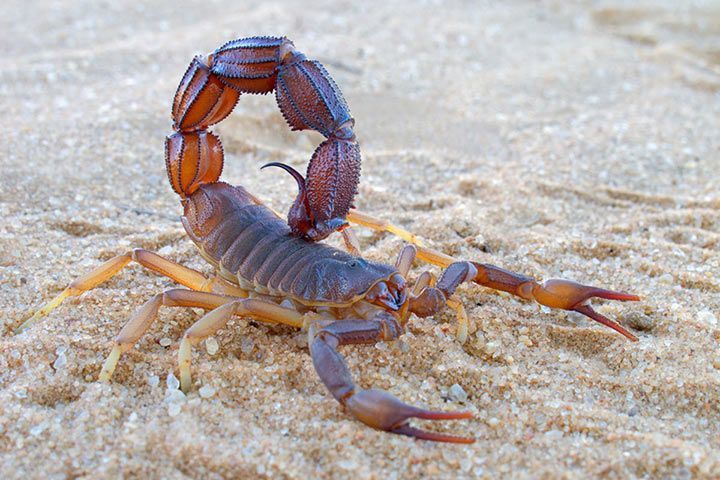
Behavior
How Do Scorpions Hunt?
Most scorpions lie in wait for prey with their claws ready and their tail cocked up. Only a few scorpions are a bit more active: They creep up on their victims or even dig out pitfalls. The food is being squished by means of biochemical processes. Enzymes (= proteins) are injected into the body of the prey and transform it into a liquid substance for the scorpion to slurp. Scorpions adapt their venom to their currently favored „snack“. Some venoms are specifically effective with insects, others with crustaceans or invertebrates. Yet, none of the poisons has an effect on meerkats and porcupines, so every attempt is in vain: They are either immune (not sensitive) or resistant against scorpion poison.
How Long Can Scorpions Go Without Food?
If there is not enough food around, the scorpion slows down its metabolism by one third. A single insect is enough for it to survive for a whole year. Yet, scorpions still need water. But beware: A slow metabolism does not imply that the scorpion is moving slowly. Even under those conditions the scorpion is able to start up and sting very fast.
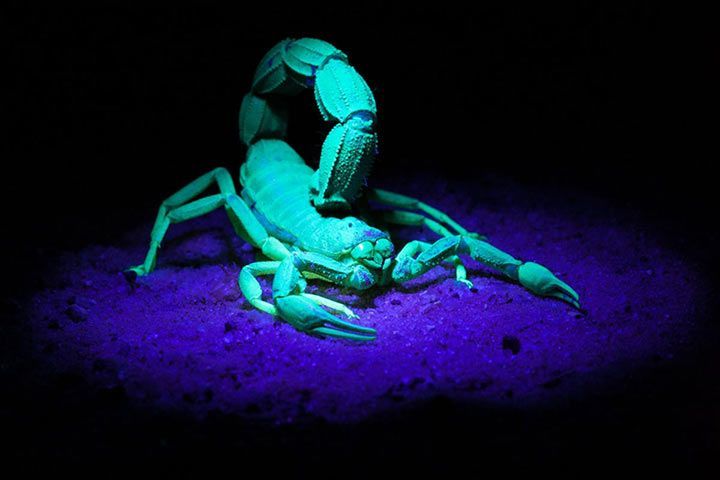
Senses and Abilities
Do Scorpions Have Good Eyesight?
Scorpions have two eyes in the front of their bodies and 2-5 eyes on each side. But they still cannot see very well. They only recognize movements and differences between light and dark.
Scorpions Glow in the Dark
Afraid of scorpions? Use a lamp with ultraviolet light! Scorpions have a fluorescent substance in their bodies that shines in the dark. This makes them easy to detect.
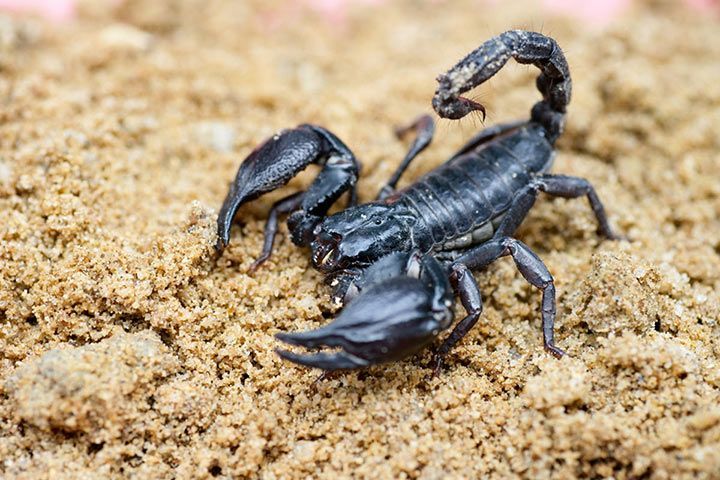
Reproduction
Scorpion Babies Ride on Their Mother's Back
Scorpion babies look exactly like adult scorpions, except that they are very small and very brightly colored. They are not yet able to sting. As soon as they have hatched the little rascals climb onto the back of their mother and stay there and relax until their first molting. Yet, this doesn’t always work out – if the mother does not find any food she sometimes eats her own kids.
Scorpion Venom
Are Scorpions Dangerous?
Scorpions in Europe are usually not very venomous. If you are lucky enough to come across one of those nocturnal arachnidae, you should be careful not to get too near. Its sting is not life-threatening, but it hurts like the sting of a bee or a wasp. Scorpions that can be dangerous to humans mostly live in North Africa, in the Middle East, and in Central and South America. Also good to know: Scorpions stay in the same area during their entire lives.
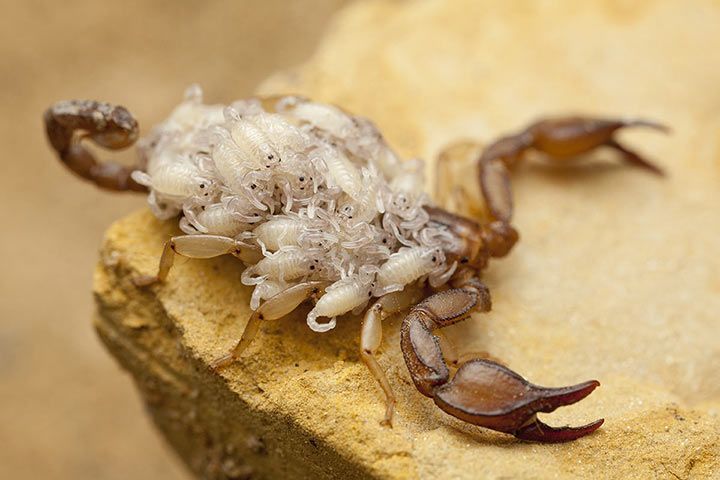
Fun Facts
Do Scorpions Sting Themselves?
Scorpions are said to kill themselves with their own sting when encircled by fire. This is nonsense, because the scorpion is immune against its own poison. People in Africa say that a dead scorpion attracts more scorpions. This is also just another story from the rumor mill. Scorpions are loners and hunt for live (!) prey. They only meet their fellow species during the mating season.
No Soil? No Scorpion!
Scorpions need loose soil to be able to dig little caves, which serve as hiding places and protect them against the heat and cold. If there is no cave nearby, scorpions sometimes stand upright to cool down and avoid too much contact with the hot ground. In urban areas, scorpions take shelter in houses, shoes, and even in beds.
Evolution
420 millions of years ago, scorpions lived in the water and reached a length of up to 40 inch (1 meter).









